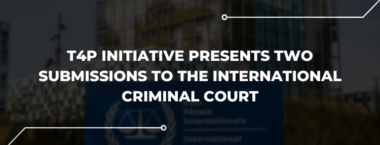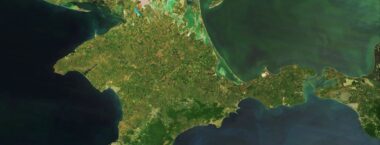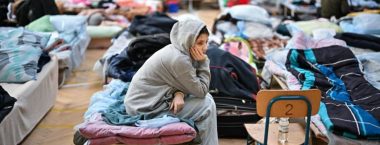
Torments, Torture Chambers, Executions: T4P Initiative Presents Two Submissions to the International Criminal Court
Information about extrajudicial executions of Ukrainians by the Russian military and Russian torture chambers in...
28 September 2023
18.05.2021
May 18 is the date when Ukraine and people worldwide commemorate victims of deportation of the Crimean Tatar people in 1944. This was one of the most atrocious crimes of the Soviet totalitarian regime. More than 45% of the deportees died due to malnutrition, illnesses, and forced labor during the early years after the deportation. The Verkhovna Rada of Ukraine recognized the deportation of 1944 as a genocide of the Crimean Tatar people.
In 2014 Russia, a state that considers itself a legal successor to the Soviet Union occupied Crimea. From the early days of occupation, Russian authorities, just like 70 years ago, started persecuting Crimean Tatars. The Russian state is trying to push Crimean Tatars out of the peninsula because of their resistance to the Russian occupational authorities. During the first year of occupation, 150 Crimean Tatars became victims of politically motivated persecution. Over just a few years of occupation, sixteen Crimean Tatars became victims of forced disappearances. Six of them have been found dead. The fate of the other ten remains unknown. In 2016 Russian state recognized the Crimean Tatar representative body, Majlis, an extremist organization. The activity of Majlis on the territory of the occupied Crimea and in Russia is forbidden.
In order to protect the rights of Crimean Tatars, the Verkhovna Rada of Ukraine adopted a decree #1140-18 “On the Statement by the Verkhovna Rada of Ukraine regarding the guarantees of rights of the Crimean Tatar people within the Ukrainian state.” That decree recognized Crimean Tatars as one of the Indigenous people of Ukraine. It guaranteed their right to self-determination within the Ukrainian state.
After seven years of occupation, we, the representatives of the Ukrainian civic society, have to state that persecution of Crimean Tatars does not stop. At this moment, 97 Crimean Tatars face politically motivated criminal prosecution; 80 remain behind bars. Crimean Tatar activists are being found guilty of alleged participation in terrorist organizations. The punishment for those fabricated charges reaches dozens of years in prison. During the Soviet years, Kremlin accused Crimean Tatars of collaborating with Nazis. Today Russian authorities describe the whole Crimean Tatar people as “terrorists” and “extremists.” Over the last two years, more than half of all politically motivated searches in Crimea took place in Crimean Tatar homes. According to one of the female witnesses, those searches became so frequent that some Crimean Tatar women sleep in their hijabs because they expect morning raids by the Russian FSB. Crimean Tatar men joke: if you wake up and there is no search, consider it a good morning. Before important dates for the Crimean Tatar people, Crimean Tatar activists receive threats in the form of warnings that inform about the unacceptability of the violation of the law. Wives and mothers of political prisoners face persecution for their solitary protests in support of their relatives. Mosques face searches; those imams who are not loyal to occupants face persecution for their religious activity.
Today the Crimean Tatar people in Crimea live in constant fear of arrests, searches, and additional humiliating accusations and hatred. As representatives of the human rights organization of Ukraine, we condemn the Russian persecution of Crimean Tatars in Crimea. We further emphasize that those actions by Russian occupants constitute a crime against humanity (art. 7(1)(h) of the Rome Statute of the International Criminal Court, 1988).
We demand that Russian Federation:
We call on the foreign states and international organizations:
NGO “CrimeaSOS”
Center of Civil Liberties
Association of the Kremlin Political Prisoners’ Relatives
ZMINA Human Rights Center
Ukrainian Helsinki Human Rights Union
Media Initiative Group for Human Rights
ALMENDA Civil Education Center
If you find an error on our site, please select the incorrect text and press ctrl-enter.

Information about extrajudicial executions of Ukrainians by the Russian military and Russian torture chambers in...
28 September 2023

On June 6, 2023, the Southern Area Military Court of Rostov-na-Donu sentenced Mr.Bohdan Ziza, a...
08 June 2023

On April 4, 2023, the Cabinet of Ministers of Ukraine (CMU) approved Order No. 288-r,...
03 May 2023

Since the beginning of the full-scale Russian invasion of Ukraine, about 150,000 civilians who fled...
17 October 2022